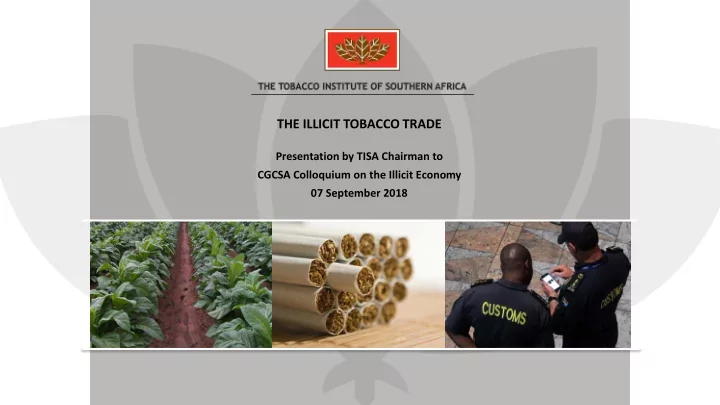

THE ILLICIT TOBACCO TRADE Presentation by TISA Chairman to CGCSA Colloquium on the Illicit Economy 07 September 2018 National study on the illicit trade and its implications 5 July 2018
TISA SCOPE & MANDATE TISA is the industry body for the legal tobacco sector in SA; mandate extends into the Southern African Customs Union (SACU) region. TISA represents farmers, leaf processors, leaf merchants, manufacturers, importers and exporters of all tobacco products; in the legally compliant industry. Clear distinction between legal and illegal industry Strategic objectives: ‒ Regulation (secure a reasonable regulatory framework for the sector) ‒ Illicit Trade (strategy to bring down illicit rates in cooperation with Govt) ‒ To ensure the sustainability of tobacco sector, including farmers. TISA believes in public/private partnerships to achieve objectives for the Govt (NDP), the sector and SA pty ltd, on the basis of trust, mutual respect and good relationships.
Illicit Trade - Understanding the Problem: Counterfeit, non-compliant, Duty not Paid (local manufacturing or smuggled) Is the product compliant with National Health Regulations? R 17-85/20 Yes Is the product sold below the MCT (minimum collectable tax) ILLEGAL Yes, requires No investigation TRADE
Illicit Trade – Domestic Illicit (locally manufactured) is the problem Global Illicit Tobacco Trade Trends South Africa Illicit Tobacco Trade Trends Contraband Contraband 2,0% 7,0% Cheap Whites Cheap Whites 0,0% 0,0% 16,0% Local Tax Evasion Local Tax Evasion Counterfeit Counterfeit 57,0% 25,0% 93,0% Source: TISA 2018 National Tobacco Market Study by IPSOS Source: Global Dashboard 2018
Legal industry rapidly losing market share to illegal cigarettes MARKET SIZE (Bn) YTD Values 30 30 30 30 30 5.9 6.0 7.4 10.5 12.8 24.1 24.0 22.6 19.5 17.2 2014 2015 2016 2017 2018 Declared Volume Undeclared Volume Source: TISA market size estimate and Treasury Stats
THE ILLICIT TOBACCO TRADE IN SA - FINANCIAL IMPACT From 2010 to 2016, Government lost more than R 27 billion in unpaid taxes. From the 2018 IPSOS research, it is estimated that Government will conservatively lose R 7 billion in unpaid taxes this year. True size of losses is most likely substantially higher.
ASIDE FROM THE FINANCIAL IMPACT…. Social Impact: Impact on health and impact on livelihoods Compromises the government’s health agenda: Market flooded with cheap cigarettes on average of R10, and as low as R5/pack. Available and affordable to children and the vulnerable in over 100,000 shops in the country. Threat to jobs, especially in deep rural areas: 8000 - 10,000 tobacco farm workers with 30,000 to 35,000 dependents 155 emerging tobacco farmers planting tobacco and food crops, promoting food security
ASIDE FROM THE FINANCIAL IMPACT…. Hurts South Africa’s attractiveness to foreign investors Tax-evading companies permitted to operate with impunity Trust in fair tax administration and the rule of law a prerequisite for investment SA can ill afford to scare off investors and job creators Organised crime: Interpol found illicit cigarette trade funds other criminal activities and fuels corruption.
Sales below R17.85 are illegal and can be seized according to legal precedent A 2015 judgment in the Eastern Cape High Court found that tobacco products selling below the tax owed must be illicit. In that matter, relating to sales of Gold Leaf Tobacco Company’s Savannah brand for R8 a pack, a price well below the tax owed to SARS, the judge found: “it is not realistically possible to sell Savannah cigarettes at R8.00 per packet, unless the applicable taxes are excluded. The logical inference to be drawn is that no excise duty was paid in respect of the cigarettes in question.”
WHAT’S TO BE DONE? Urgent action is needed Short term solutions can be effected quickly Monitor production : place customs officials in all cigarette manufacturing plants. Ban on sales below the level of tax owed / MCT (Minimum Collectable Tax). In the meantime, SAPS could rely on legal precedent to seize below R17.85 product from the market. Ratification by parliament of the FCTC Illicit Trade Protocol. Longer term solutions Replacement of the current SA diamond stamp with an electronic fiscal marker.
THANK YOU DISCLAIMER Figures and statistics referred to in this presentation, represent an industry view based on external research and publicly available market information. The definition of “illicit trade” for purposes of this document includes any product sold to consumers below R17,85, and/or being non-compliant to the Tobacco Products Control Act, No 83 of 1993 (as amended). The various brands referred to herein are assumed to be manufactured and /or distributed by the corporate entities who publicly claim to do so. TISA accepts no responsibility or liability whatsoever with regard to the information or statistics quoted incorrectly or out of context from this presentation by any person.
Recommend
More recommend